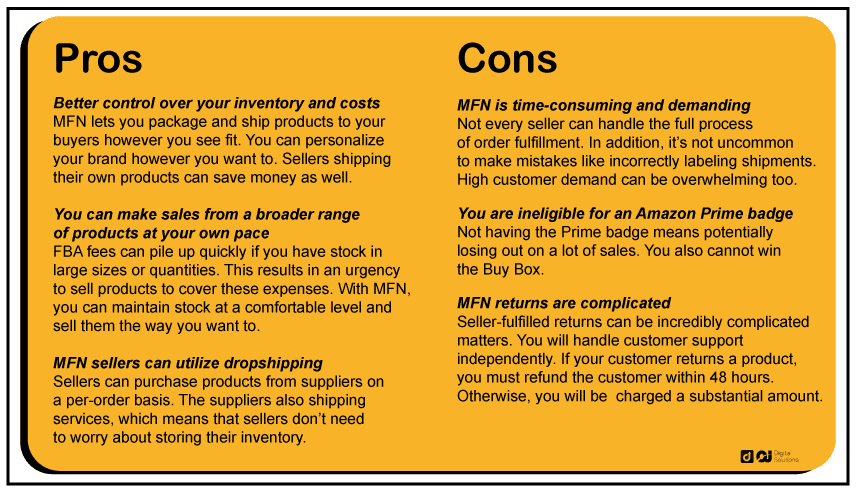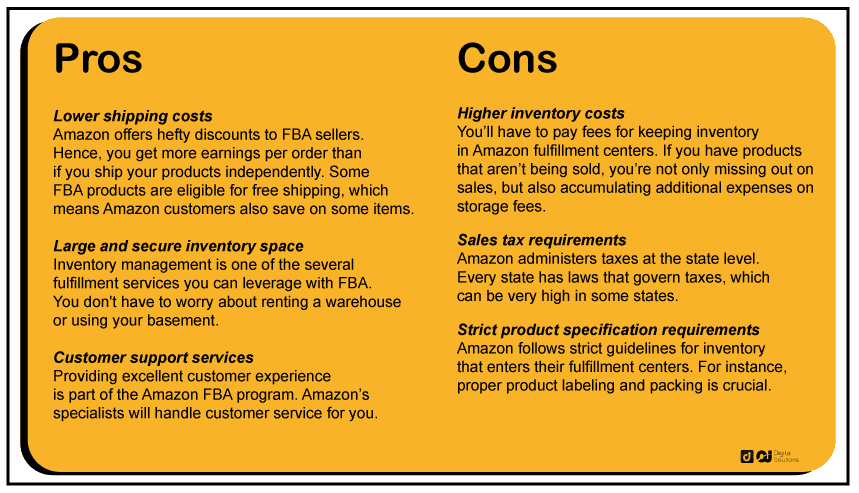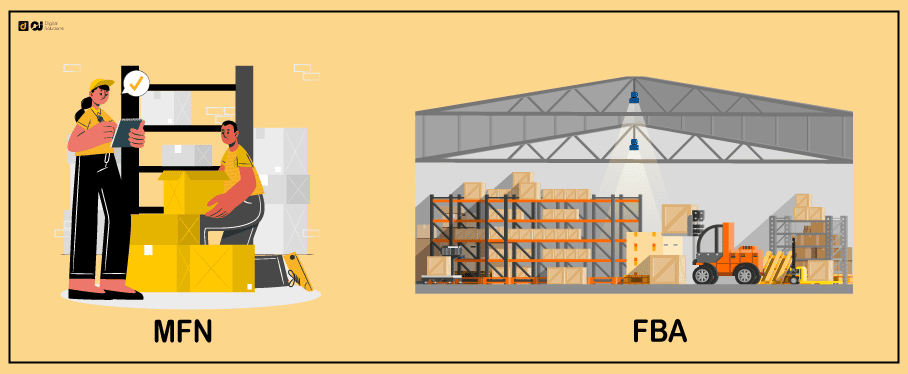Amazon sellers have a lot of decisions to make, including how their orders are fulfilled. They have two options for managing this critical process.
One is the Fulfillment by Amazon (FBA) program, in which they pay Amazon to handle the storage and shipping of their products on their behalf. The other is the Merchant Fulfilled Network (MFN) program, which lets them perform these processes on their own.
And as with most things, each method has its own set of pros and cons.
Most sellers are familiar with FBA because of its mainstream popularity. However, not many are aware of how MFN works.
That’s why we’re going to discuss how each fulfillment network works in this guide. We will also talk about how to identify the right one for you, so stay tuned.
What Is the Merchant Fulfilled Network (MFN)?
MFN (also called FBM or fulfillment by merchant) refers to merchants who ship products from their own warehouses or homes after a customer successfully places an Amazon order instead of amazon’s fulfillment centers.
With MFN, merchant fulfillment network, the seller is responsible for packaging the item, placing customer orders, and shipping the products. They’re also in charge of providing customer service and dealing with returns and refunds.
FBA vs MFN: What’s the Difference?
Aside from logistical processes, the biggest difference between the two is the level of control you get over your business. While FBA is more streamlined and offers higher chances of winning a Buy Box, it requires you to conform to specific regulations. You’ll have to keep fees in mind too.
On the other hand, MFN offers you a tighter handle over your brand. It also doesn’t require you to pay fees regularly. However, MFN doesn’t come with any of Amazon FBA’s benefits.
Let’s take a closer look each program’s pros and cons.
MFN: Pros and Cons

Pros
- Better control over your inventory and costs – MFN lets you package and ship products to your buyers however you see fit. You can personalize your brand however you want to. Sellers shipping their own products can save money as well.
- You can make sales from a broader range of products at your own pace – FBA fees can pile up quickly if you have stock in large sizes or quantities. This results in an urgency to sell products to cover these expenses. With MFN, you can maintain stock at a comfortable level and sell them the way you want to.
- MFN sellers can utilize dropshipping – Sellers can purchase products from suppliers on a per-order basis. The suppliers also shipping services, which means that sellers don’t need to worry about storing their inventory.
Cons
- MFN is time-consuming and demanding – Not every seller can handle the full process of order fulfillment. In addition, it’s not uncommon to make mistakes like incorrectly labeling shipments. High customer demand can be overwhelming too.
- You are ineligible for an Amazon Prime badge – Not having the Prime badge means potentially losing out on a lot of sales. You also cannot win the Buy Box. So you will have to go with seller fulfilled prime, which is achieved only by meeting rigurous requirements.
- MFN returns are complicated – Seller-fulfilled returns can be incredibly complicated matters. You will handle customer support independently. If your customer returns a product, you must refund the customer within 48 hours. Otherwise, you will be charged a substantial amount.
FBA: Pros and Cons

Pros
- Lower shipping costs – Amazon offers hefty discounts to FBA sellers. Hence, you get more earnings per order than if you ship your products independently. Some FBA products are eligible for free shipping, which means Amazon customers also save on some items.
- Large and secure inventory space – Inventory management is one of the several fulfillment services you can leverage with FBA. You don’t have to worry about renting a warehouse or using your basement.
- Customer support services – Providing excellent customer experience is part of the Amazon FBA program. Amazon’s specialists will handle customer service for you.
Cons
- Higher inventory costs – You’ll have to pay fees for keeping inventory in Amazon fulfillment centers. If you have products that aren’t being sold, you’re not only missing out on sales, but also accumulating additional expenses on storage fees.
- Sales tax requirements – Amazon administers taxes at the state level. Every state has laws that govern taxes, which can be very high in some states.
- Strict product specification requirements – Amazon follows strict guidelines for inventory that enters their fulfillment centers. For instance, proper product labeling and packing is crucial.
How to Decide Which One Is Right for You

Weighing the pros and cons of each option can be a daunting task. To help you come up with a decision more easily, we made a short checklist for each one.
FBA VS FBM
Choose the FBA option for your amazon business if:
- You have a lot of inventory to sell within 6 months
- You have higher margins on your product. For reference, Amazon takes 18% of seller fees. If you can still make profits with that accounted for, then FBA will make sense for you.
- You want to be eligible for Prime status and reach Prime buyers.
- You want to win the buy box immediately.
On the other hand, amazon MFN will suit you if:
- You sell products on a smaller scale, or sell rare items that are more feasible to fulfill independently.
- You prefer to have full control over all aspects of your business.
- You have smaller product margins and would like to capitalize on every sale.
- You store products for a long period of time (save on expensive long term storage fees)
FAQ – Frequently Asked Questions
Can You Get Seller-Fulfilled Prime with MFN?
Prime members are important and anyone using the Amazon MFN model should incorporate it in their business.
The Amazon Seller Fulfilled Prime Program allows only the qualified MFN sellers to use the Prime badge. To acquire the Prime tag, the sellers must meet the Fulfilled Prime strict requirements that state:
- All cancellation rates should be less than 0.5% per order.
- Offer Premium shipping options for prime customers
- Ship out over 99% of the orders on time.
- Use shipping methods that support weekend (Saturday or Sunday) delivery and pickup.
- Must meet the one or two day delivery targets.
- Use Amazon buy shipping services for more than 98.5% of the orders.
- Accept all the Amazon Returns Policy.
- Allow for all the customer service inquiries to be handled by Amazon
Please note, at the moment, Amazon has halted the enrollment process for new Seller Fulfilled Prime Program. But you can still send an application and join the waitlist.
Is Amazon MFN Right for Me?
This depends on your expertise. If want the best for your business, keep in mind that Amazon MFN helps you save on additional costs but leaves you with a lot of responsibilities. FBA lifts most of the responsibilities but the high fba fees can drain you.
I suggest trying both programs to maximize your exposure. You can try having some products with FBA fulfillment (convert to FBA on seller central) while others with FBM. That way you can juggle between FBA and MFN as your business grows.
During the initial stages, use the FBA trial period to speed up your growth and when the offer sells out, switch to MFN while using a third party service to save on monthly storage fees instead of paying the fulfullment fees storing the products in amazon’s warehouses. At the end, you’ll have a clear picture which program favors your business.
Bottom Line
Now that you understand how FBA and MFN work, it’s time to decide. Which model are you going to adopt in your business?
Amazon FBA offers many benefits, but comes with fees for extra services like refunds and monthly warehouse fees. The good news is that you don’t need a lot of money to start an FBA business.
On the other hand, MFN sellers can save money on fees at the cost of additional work.
We hope that this guide has helped you come up with a decision that’s advantageous for your business. Visit our blog for more tips for Amazon sellers.




